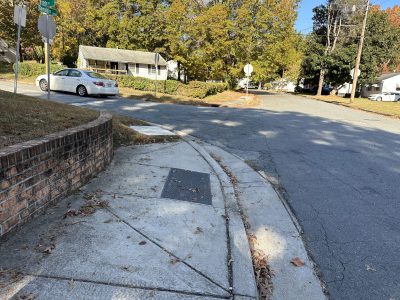Talk of transferring the Rich Fork Preserve from Guilford County to the YMCA of High Point reopens a disagreement over whether mountain biking should be allowed on the property.
Talk between leadership of the Guilford County Commission and the YMCA of High Point about potentially transferring the Rich Fork Preserve to the nonprofit agency is causing consternation among a group of High Point citizens and a larger cohort of natural preservation advocates across the county.
The latest eruption of bad feeling builds on a deadlocked disagreement over whether the public land should accommodate mountain biking as well as frayed trust coming out of the Republican commissioners’ decision to dissolve the open space committee, which had guided acquisition and stewardship of several properties.
Guilford County Commission Chairman Hank Henning, who lives in High Point, said he initially reached out to the YMCA because he thought the agency could help resolve a challenge over access for mountain bikers to the property. The YMCA is located at the north end of the preserve just across West Hartley Drive; the preserve stretches down to Northwood Elementary on West Lexington Avenue at the south end. Under the most recent draft of the master plan for the preserve, mountain bikers would have access from Homestead Avenue at the east side of the property, which alarmed residents on the street.
“They didn’t want droves of mountain bikers coming through to access the park,” Henning said. “I can sympathize with that. We don’t want to make the park intrusive for the neighbors.”
The proposal has drawn quick opposition from members of the defunct open space committee, along with a High Point group that was formed at the request of the open space committee to develop a stewardship plan for the Rich Fork Preserve. Dot Kearns, a former Democratic county commissioner and school board member from High Point, chairs the local committee.
“It seems to me that if the intent of the referendum, which was passed, is not carried out according to the information that was given to voters, then the voters it seems to me have very little trust that the next one will be carried out,” Kearns said. “It seems to me unwise to change the format of what was approved.”
Henning attempted to allay concerns about a potential transfer of the property in a recent interview with Triad City Beat.
“We can’t just give it to them; we could do a stewardship agreement,” he said. “They would have to honor the deed restrictions and honor the open space restriction. If they wanted to get rid of it or develop it, it would revert to us anyway.”
Henning said he doesn’t understand why anyone would oppose a collaboration between the county and the YMCA.
“I was concerned about the neighbors,” he said. “We talked about the access, but also the budget. Look at the master plan: There’s speculation of spending anywhere to $1 million on this. If someone else wants to manage it and they want to develop the trails, why not do that? The cost is taken off the taxpayers.”
The point about saving taxpayer money by outsourcing stewardship is likely to strike open space advocates and their allies on the local Rich Fork committee as a supreme irony: They’ve always opposed mountain biking on the preserve and advocated that it be limited to low-impact recreational activities like hiking.
The local committee embraced the advice of outside experts brought in to visit the preserve, including Preservation North Carolina President Myrick Howard, Kearns said. She added that Howard counseled: “Don’t spend a lot of money on it. Keep it like it is.”
Henning said the latest draft of the master plan for Rich Fork Preserve, which has yet to be approved by the county commission, allows mountain biking on 15 acres of the 116-acre tract. A potential transfer of the property to the YMCA would have no bearing on whether mountain biking is allowed or not, he said.
“Since that is a board of commissioners’ decision, that’s almost moot,” Henning said. “We could put in an agreement that they definitely have to allow mountain bikes or not. That topic has nothing to do with the YMCA.”
Kara Millonzi, an associate professor of public law and government at the UNC School of Government in Chapel Hill, said it’s generally legal for the county to transfer land to a nonprofit entity for less than market value. The biggest potential legal hurdle, she said, is that if the debt on the bond has not been paid off, the lender might want the county to keep the property as security. Under state law, Millonzi said, the county can convey property to a nonprofit agency with restrictions spelling out that the agency must use the property for certain public purposes.
Beyond the question of whether mountain biking should be allowed, Kearns’ group and the county’s Republican leadership have expressed similar aspirations for the preserve.
“The property is wedged between Northwood Elementary and the YMCA,” Henning said. “What better opportunity do we have to engage the community for the benefit of High Point? Having youth activities in there to experience nature, if you want to preserve something you’ve got to teach it to the next generation. I don’t see anything negative about this.”
Although she does not agree with transferring the property to the YMCA, Kearns said her group has never opposed bringing in an outside group to act as a steward of the preserve. She added that she’s always recognized that the county commission holds the ultimate decision-making authority, but that she thought the Rich Fork committee had been working on the county’s behalf.
“We came with great joy and with hope that it would be a wonderful place,” Kearns said. “We thought that the history was a little unusual for a preserve like that, but we hoped it would be a boon for citizens and students throughout the years.”
Join the First Amendment Society, a membership that goes directly to funding TCB‘s newsroom.
We believe that reporting can save the world.
The TCB First Amendment Society recognizes the vital role of a free, unfettered press with a bundling of local experiences designed to build community, and unique engagements with our newsroom that will help you understand, and shape, local journalism’s critical role in uplifting the people in our cities.
All revenue goes directly into the newsroom as reporters’ salaries and freelance commissions.






Leave a Reply